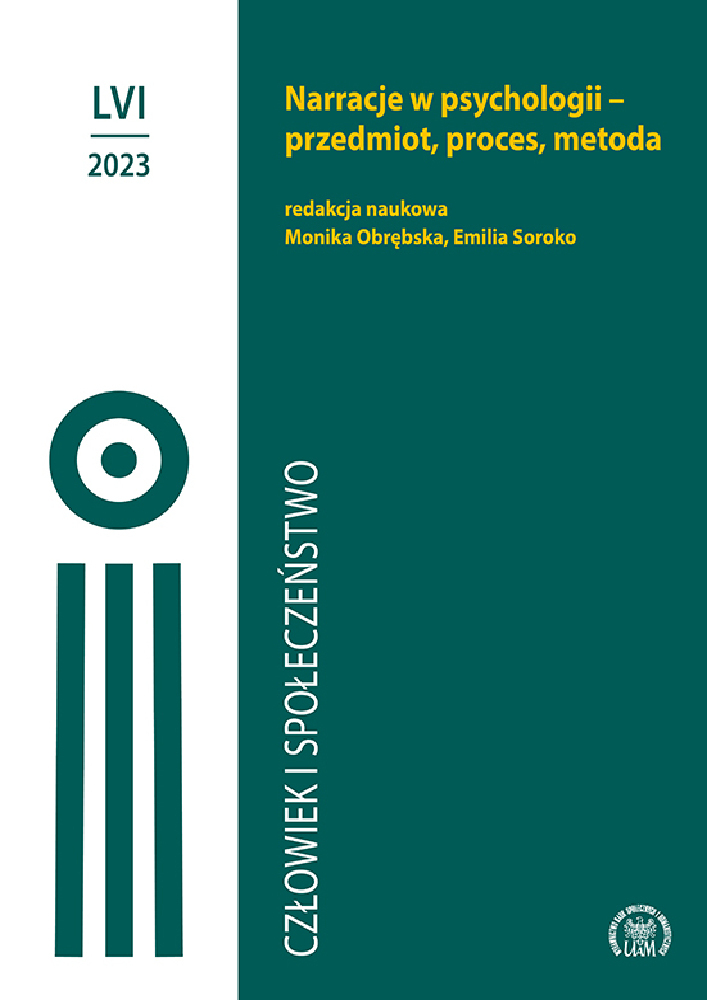Abstract
The text is an analysis of interrelations binding autobiographical narration to individual and social identity. The first part tackles the fundamental connection between narration and individual, personal identity of the narrator – Paul Ricoeur, serving as a guide to this fundamental part of the proposed analysis, assumes that the narrative continuum follows and imitates the temporal continuum, constituting a flow in which it becomes possible to inscribe stories modifying and corroborating the reflected course of life. Conceptualizing and bringing to consciousness one’s course of life, auto-narration constitutes both a form of conscientious self-judgement and an occasion for self-deception. In the second part, the author attempts to show how auto narration and its significance for the individual identity changes, when it gets written down in the form of autobiography, subjected to the rigor of the writing and entering in complex interrelationships with social memory and identity. Here the author’s guides are among others Philippe Lejeune, Janet Verner Gunn and Georges Gusdorf. In the third part, the hitherto reconstructed structure of auto-narration and autobiography is destroyed: referring to such authors as Louis A. Renza, Jean Starobinski, John Sturrock, Michel Beaujour and Jacques Derrida, I demonstrate that the autobiographical undertaking is doubtful, and that the optimistic project of saving oneself by means of auto-narration and autobiography is an illusion. The presence of Derrida in the text is scarcely visible; yet it is Derrida, in dialogue with the late Ricoeur, that show us the way out from the autobiographical and identitary trap.
References
Auge, M. (2009). Formy zapomnienia, tłum. A. Turczyn. Kraków: Universitas.
Bacon, F. (1955). Novum Organum, tłum. J. Wikarjak. Warszawa: Państwowe Wydawnictwo Naukowe.
Beaujour, M. (2009). Autobiografia i autoportret, tłum. K. Falicka. W: M. Czermińska (red.), Autobiografia (ss. 98–125). Gdańsk: słowo/obraz terytoria.
Burek, T. (1981). Autobiografia jako rozpamiętywanie losu: nie tylko o „Rodzinnej Europie”. Pamiętnik Literacki, 4(72), 123–141.
Czermińska, M. (2000). Autobiograficzny trójkąt: świadectwo, wyznanie i wyzwanie. Kraków: Universitas.
Derrida, J. (2004). Freud i scena pisma, tłum. K. Kłosiński. W: idem, Pismo i różnica (ss. 347–402). Warszawa: Wydawnictwo KR.
Dilthey, W. (2004). Budowa świata historycznego w naukach humanistycznych, tłum. E. Paczkowska-Łagowska. Gdańsk: słowo/obraz terytoria.
Domański, J. (2002). Tekst jako uobecnienie. Kęty: Antyk.
Eco, U. (1994). Dzieło otwarte: forma i nieokreśloność w poetykach współczesnych, tłum. J. Gałuszka i in. Warszawa: Czytelnik.
Godlewski, G. (2010). David Olson, odkrywca „papierowego świata”. W: D. Olson, Papierowy świat. Pojęciowe i poznawcze implikacje pisania i czytania, tłum. M. Rakoczy (ss. 7–21). Warszawa: Wydawnictwa Uniwersytetu Warszawskiego.
Gunn, J.V. (2009). Sytuacja autobiograficzna, tłum. J. Węgrodzka. W: M. Czermińska (red.), Autobiografia (ss. 145–168). Gdańsk: słowo/obraz terytoria.
Gusdorf, G. (2009). Warunki i ograniczenia autobiografii, tłum. J. Barczyński. W: M. Czermińska (red.), Autobiografia (ss. 19–46). Gdańsk: słowo/obraz terytoria.
Lejeune, Ph. (2001). Wariacje na temat pewnego paktu. O autobiografii, tłum. W. Grajewski i in. Kraków: Universitas.
Lejeune, Ph. (2010). „Drogi zeszycie…”, „drogi ekranie…”. O dziennikach osobistych, tłum. A. Karpowicz, M. i P. Rodak. Warszawa: Wydawnictwa Uniwersytetu Warszawskiego. Man, P., de (1986). Autobiografia jako od-twarzanie, tłum. M.B. Fedewicz. Pamiętnik Literacki, 2(77), 307–318.
Olson, D.R. (2010). Papierowy świat. Pojęciowe i poznawcze implikacje pisania i czytania, tłum. M. Rakoczy. Warszawa: Wydawnictwa Uniwersytetu Warszawskiego.
Renza, L.A. (2009). Wyobraźnia stawia veto: teoria autobiografii, tłum. M. Orkan-Łęcki. W: M. Czermińska (red.), Autobiografia (ss. 47–82). Gdańsk: słowo/obraz terytoria.
Ricoeur, P. (2003). O sobie samym jako innym, tłum. B. Chełstowski. Warszawa: Wydawnictwo Naukowe PWN.
Ricoeur, P. (2008a). Czas i opowieść, t. 1: Intryga i opowieść historyczna, tłum. M. Frankiewicz. Kraków: Wydawnictwo Uniwersytetu Jagiellońskiego.
Ricoeur, P. (2008b). Czas i opowieść, t. 2: Konfiguracja w opowieści fikcyjnej, tłum. J. Jakubowski. Kraków: Wydawnictwo Uniwersytetu Jagiellońskiego.
Ricoeur, P. (2008c). Czas i opowieść, t. 3: Czas opowiadany, tłum. U. Zbrzeźniak. Kraków: Wydawnictwo Uniwersytetu Jagiellońskiego.
Skarga, B. (1995). Tożsamość, ja i pamięć. Znak, 5(480), 4–18.
Starobinski, J. (2009). Styl autobiografii, tłum. W. Kwiatkowski. W: M. Czermińska (red.), Autobiografia (ss. 83–97). Gdańsk: słowo/obraz terytoria.
Strauss, A.L. (1984). Chronic Illness and the Quality of Life. St. Louis: Mosby.
Sturrock, J. (2009). Nowy wzorzec autobiografii, tłum. G. Cendrowska. W: M. Czermińska (red.), Autobiografia (ss. 126–144). Gdańsk: słowo/obraz terytoria.
Zaleski, M. (2004). Formy pamięci. Gdańsk: słowo/obraz terytoria.
License
Copyright (c) 2023 Magdalena Żardecka

This work is licensed under a Creative Commons Attribution 4.0 International License.
1. W momencie złożenia pracy celem rozpoczęcia postępowania w sprawie publikacji, Licencjodawca, zwany dalej Autorem, akceptuje wszystkie zasady umieszczone na stronie internetowej czasopisma “Człowiek i Społeczeństwo”, udzielając Licencjobiorcy, zwanego dalej Wydawcą, niewyłącznej i nieodpłatnej licencji na korzystanie z Utworu. Licencja zakłada tym samym brak ograniczeń terytorialnych, czasowych oraz ilościowych na następujących polach eksploatacji (art. 50 ustawy z dnia 4 lutego 1994 r. o prawie autorskim i prawach pokrewnych):
a. utrwalanie Utworu;
b. zwielokrotnienie Utworu drukiem i w wersji cyfrowej;
c. wprowadzenie do obrotu, użyczenie lub najem oryginału/zwielokrotnionych egzemplarzy Utworu;
d. publiczne wykonanie, wystawienie, wyświetlenie, odtworzenie oraz nadawanie i reemitowanie, a także publiczne udostępnianie Utworu w taki sposób, aby każdy mógł mieć do niego dostęp w miejscu i w czasie przez siebie wybranym;
e. włączenie Utworu w skład utworu zbiorowego;
f. wprowadzenie Utworu w postaci elektronicznej na platformy elektroniczne lub inne wprowadzenie Utworu w postaci elektronicznej do Internetu, Intranetu, Extranetu lub innej sieci;
g. rozpowszechnianie Utworu w wersji elektronicznej w Internecie, Intranecie, Extranecie lub innej sieci, w pracy zbiorowej, a także samodzielnie w formule Open Access w oparciu o licencję Creative Commons Uznanie autorstwa 4.0 Międzynarodowa Licencja Publiczna (CC BY 4.0), a także inną wersję językową tej licencji, lub którąkolwiek późniejszą wersję tej licencji.
2. Założenia licencji Creative Commons Uznanie autorstwa 4.0 Międzynarodowa Licencja Publiczna (CC BY 4.0), udzielają Wydawcy upoważnienia do kopiowania, zmieniania, rozprowadzania, przedstawiania i wykonywania Utworu jedynie pod warunkiem uznania autorstwa.
3. Wraz z dostarczeniem Utworu, Autor zobowiązuje się do wypełnienia, podpisania oraz odesłania skanu umowy

